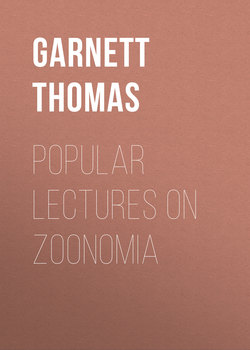Popular Lectures on Zoonomia

Реклама. ООО «ЛитРес», ИНН: 7719571260.
Оглавление
Garnett Thomas. Popular Lectures on Zoonomia
AN ACCOUNT OF THE LIFE OF THE AUTHOR
LECTURE I. INTRODUCTION
LECTURE II. RESPIRATION
LECTURE III. CIRCULATION OF THE BLOOD
LECTURE IV. DIGESTION, NUTRITION, &c
LECTURE V. OF THE SENSES IN GENERAL
LECTURE VI. TASTE AND SMELL
LECTURE VII. SOUND AND HEARING
LECTURE VIII. VISION
LECTURE IX. THE LAWS OF ANIMAL LIFE
LECTURE X. THE LAWS OF ANIMAL LIFE, CONTINUED
LECTURE XI. OF THE NATURE AND CAUSES OF DISEASES
LECTURE XII. ON INFLAMMATION AND ASTHENIC DISEASES
LECTURE XIII. ON THE GOUT
LECTURE XIV. NERVOUS COMPLAINTS, &c
THE END
INDEX
Отрывок из книги
I AM well aware of the difficulties attending the proper composition of a popular course of lectures on the animal economy, which must be essentially different from those generally delivered in the schools of medicine; because it professes to explain the structure and functions of the living body, to those who are supposed to be unacquainted with the usual preliminary and collateral branches of knowledge. It must be obvious to every one, that it can be by no means an easy task to give in a few lectures, a perspicuous view of so extensive a subject; but I trust that the consideration of this difficulty will readily extend to me your indulgence.
That such a course, if properly conducted, must be interesting, needs scarcely to be observed; for the more we examine the structure and functions of the human body, the more we admire the excellence of the workmanship, and beauty of contrivance, which presents itself in every part, and which continually shows the hand of omniscience. The most ingenious of human inventions, when compared with the animal frame, indicate a poverty of contrivance which cannot fail to humble the pretensions of the sons of men. Surely then there are few who will not feel a desire to become acquainted with subjects so interesting.
.....
Concerning the manner in which we become acquainted with external things, by means of the senses, we know nothing. Many hypotheses have been offered to explain this: none of them however are the result of experiment and observation. Many philosophers have supposed the universe to be filled with an extremely subtile fluid, which they have termed ethereal; and this hypothesis has been sanctioned by the illustrious authority of Newton. He however merely offered it in the modest form of a query, for the attention of other philosophers; little thinking that it would be made use of to explain phenomena which they did not understand. His query about a subtile elastic fluid pervading the universe, and giving motion and activity to inert masses of matter, and thereby causing the phenomena of attraction, gravitation, and many other appearances in nature, was immediately laid hold of by his followers, as a fact sufficiently supported, because it seemed to have the sanction of so great an authority.
This hypothesis was made use of to explain a great number of phenomena, and the physiologists, whose theories were generally influenced by the prevailing philosophy, eagerly laid hold of it to explain the phenomena of sensation, and muscular motion. When an impression was made upon any part of the external surface of the body, whether it was occasioned by heat, or mechanical impulse, they supposed, that the ether in the extremities of the nerves was set in motion. This motion, from the energy of the ether, is communicated along the nerves to the brain, and there produces such a change as occasions a consciousness of the original impression, and a reference in the mind to the place where it was made. Next they supposed, that the action of the will caused a motion of the ether to be instantly propagated along the nerves that terminate in the fibres of the muscles, which stimulated them to contraction.
.....